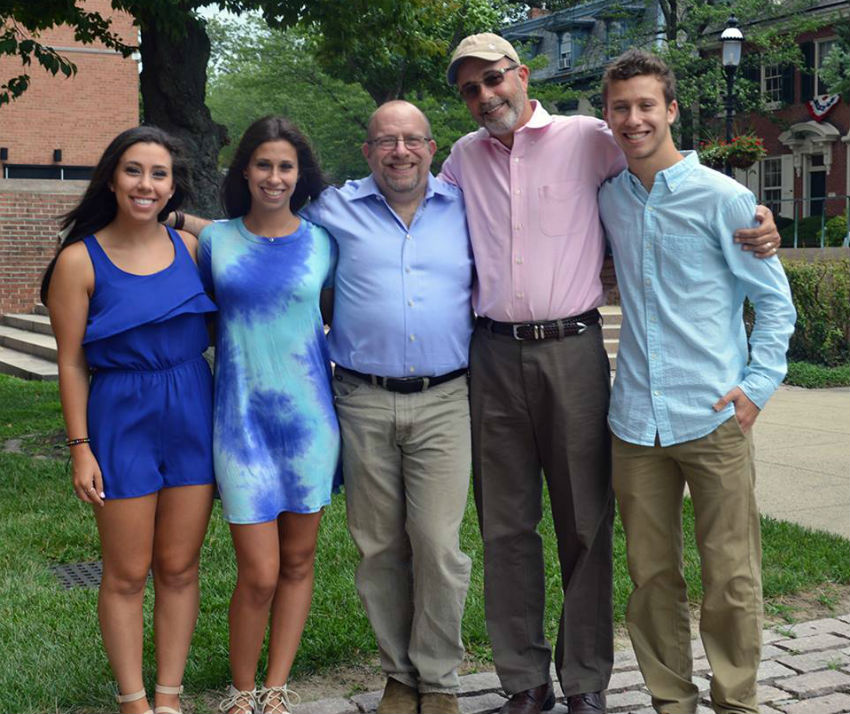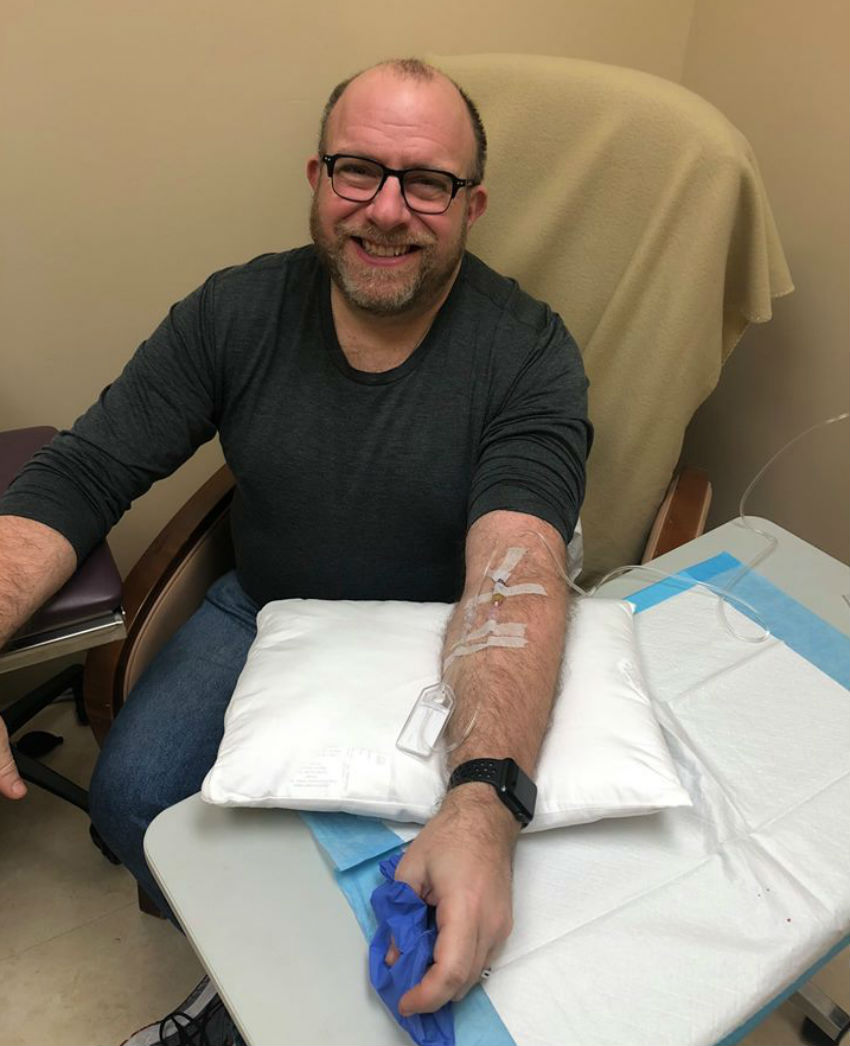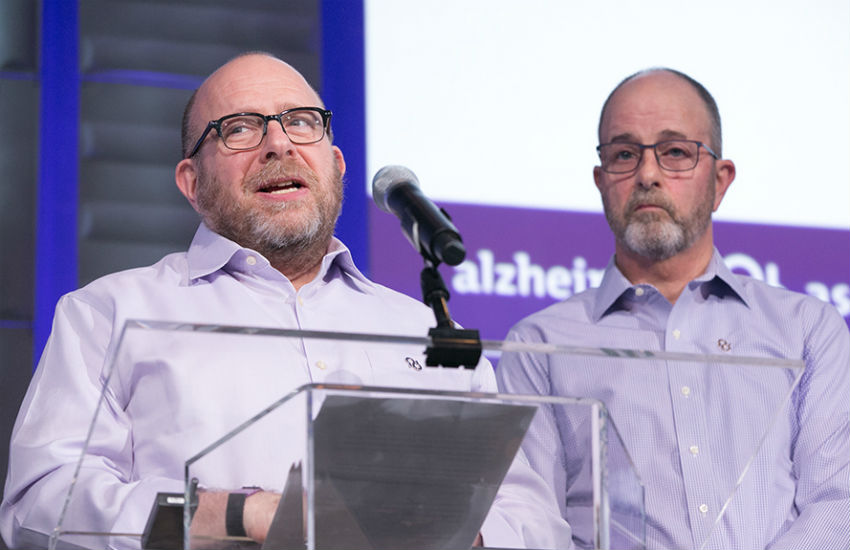Most of us think of June as Pride Month, but in the US it’s also Alzheimer’s and Brain Awareness Month. One man acutely aware of this is 56-year-old Phil Gutis.
Gutis was diagnosed with Alzheimer’s two years ago. Although we tend to think of Alzheimer’s only as a disease of the elderly, Gutis is one of the 4% to develop early-onset Alzheimer’s. This relates to anyone developing the disease before the age of 65.
Whatever age you develop Alzheimer’s, a diagnosis is devastating. The disease is the most common form of dementia. Proteins build up to form ‘plaques’ on nerve cells – eventually leading to the loss of nerve tissue in your brain.
Sufferers also develop a lack of particular chemical transmitters between nerve cells. Early stages include memory loss and communication problems. The loss of nerve function will lead to problems with reasoning and orientation.
Symptoms become more severe as time progresses. The condition is terminal, but how long someone lives can vary greatly. It can advance more quickly in younger people.
Phil Gutis
Gutis was born and raised in Pennsylvania, but has spent time living in Washington DC and New York City, before relocating back to living outside of Philadelphia. He moved back to his home state when his late father’s health began to fail. He has been with his partner for the past 13 years.
Gutis has worked as a reporter for the New York Times and later as an advocate for NGOs, including ACLU and Natural Resources Defense Counsel.
Via Skype, Gutis explains the events that led to his diagnosis.
‘I’ve long had what I call memory holes. It wasn’t so much my memory that was the immediate thing that drove me to get tested, but cognitive skills: maths, maps, directions. They all became very difficult, almost impossible.
‘My partner, Tim, said he was seeing things too, but he didn’t necessarily tell me at the time. I’d come out of the bedroom and asked him if he’d seen the cat, but he’d just seen me say hello to the cat. But I still came out and asked him if he’d seen where the cat was.’
‘Tim accompanied me on stage for a speech at the Alzheimer’s Association Leadership Summit, and he’s been at my side every step of this journey’ (Photo: Phil Gutis)
Gutis says the diagnosis sent him reeling. The one certainty with Alzheimer’s is that the symptoms will get worse and will eventually result in death.
‘When you land in the world of Alzheimer’s you learn that so very little is known. It’s a very individual diseases. Early onset Alzheimer’s can sometimes move more quickly. When I was diagnosed, a famous woman here called Pat Summitt, a basketball coach, she died of Alzheimer’s.
‘From diagnosis to death was five years for her. So of course, I immediately put a five-year timeline on myself. However, unless something changes very dramatically, I’m likely to live past five years, but they don’t know. They really don’t.’
Impact on mental health
Gutis says the diagnosis has deeply impacted his mental health.
‘I still struggle. I’ve suffered from depression most of my life and very quickly discovered that my medications weren’t enough and had to get my medications boosted and had to go on something for anxiety. It’s definitely taken its toll.
‘I say I have my good days and bad days with the Alzheimer’s and I have good days and bad days mentally. It’s a very fragile state of existence.
‘Something happens, and even if it had happened to someone without the diagnosis, I immediately tie it to the diagnosis and burst into tears. Like I misplace my cellphone, which happened recently … that was the thing that set me off.
‘What you find when you talk to people with Alzheimer’s, you learn to avoid as much as possible the situations that set you off.’
For Gutis, this includes crowded places, loud parties or movies, or anything that provokes too much stress. He currently works part time for an non-profit organization overseeing a local historical mill.
‘I tend to go home after work and just get into a quiet spot and read, although that’s becoming increasingly challenging. Or sometimes I just play Solitaire on my iPad until I fall asleep.’

Phil and Tim with family members on their wedding day in 2016 (Photo courtrsy Phil Gutis)
The challenges for caregivers
He says he as seen a definite worsening of his symptoms since his diagnosis. He also acknowledges the impact this has on his husband.
‘I can’t help but feel for those who don’t have the disease who are now going to have to live with and deal with a disease that, firstly, robs their partner of everything, and secondly, puts them in impossible situations.
‘It’s an impossible situation. I really feel badly for what Tim has had to go through so far, but also what he will be going through, which will be much more.’
Marriage
Gutis met his partner online 13 years ago when they both lived in Washington DC. He says things got serious between them very quickly. Despite this, he never previously had a desire to marry – having grown up at a time when he never thought he’d be allowed to marry the person he loved.
His Alzheimer’s diagnosis changed that and the two men married within a couple of months.
‘Well, it forces you to, because you know there are going to be medical decisions that arise. When you have a diagnosis of a fatal disease, you have to start putting your affairs in order. In a lot of places, with the medical stuff, if Tim weren’t my spouse, they wouldn’t talk to him. He wouldn’t have any standing or any right to be involved. I wasn’t going to have that.’
Since that time, both men have advocated to raise awareness around Alzheimer’s and Gutis has taken part in drug trials for potential treatments.
This week, they are among the many taking part in the Alzheimer’s Association’s Longest Day fundraiser. It takes place each summer solstice. They will be throwing a party and silent auction at the Prallsville Mill, where Gutis works. He hopes it will raise around $5,000.
Increase in Alzheimer’s
Some 5.7million Americans have Alzheimer’s. This include 200,000 under the age of 65. Over 65, one in ten Americans are affected by the disease.
As we live for longer and find more successful treatments for cancer and heart disease, the number of people developing dementia in old age is growing. In Scotland, for example, Alzheimer’s and dementia now account for one in every ten deaths – double the rate from a decade ago.

‘Shortly after my diagnosis, I decided to enroll in a clinical trial for an investigational treatment’ (Photo courtesy Phil Gutis)
Scientists still don’t know what causes the disease, but think it may be linked to particular genes. Gutis can fully understand why many people have little desire to find out if they have the genes linked to an increased risk of Alzheimer’s when there is currently no cure. He believes people should consider getting tested if only to take part in future trials of treatments.
‘I’ve said this to my sister and her kids: get tested, see if you carry the genes, because there are some genes associated with it, but the response tends to be, “I don’t want to know – why would I want to carry that around with me unless there was some reason to know?”
‘I understand that completely. It’s devastating knowledge. There’s an altruistic element to getting tested early … that’s the only way we’re going to find a cure for this, if people step up and say, “I carry the genes” or they find through a scan that you’re in danger of developing this.’
‘Don’t let them fade away’
Beyond this, he wants people to also think about the burden of Alzheimer’s on sufferers and their caregivers.
‘Someone was telling me a story about being in a supermarket with his wife. She had been in denial about things and didn’t want to know, but had finally agreed to being tested and had been diagnosed.
‘And she started fighting with him over whether they needed something in the supermarket. His take was “yes we do,” and hers was “No we don’t,” and she picked it up out of the cart and threw it on the floor.
‘The packet burst all over the place, and there he was standing there with a bag of pasta everywhere. That, unfortunately, and worse, is what many caregivers have to deal with. Because personalities change. As the disease progresses, people can become argumentative and angry.
‘It’s a very isolating disease, because of situations like that. People don’t tend to go out much, people lose friends, and friends kind of fall away.
‘Remember those who are caregivers. Try and maybe come in and sit with someone for an hour or two and give them a break. Just be a friend. Don’t let them fade away because it’s really important.’
The Alzheimer’s Association carries further information and advice around dementia.
See also
This new program in Canada is helping LGBTI seniors with dementia
My partner stopped having sex with me after being diagnosed with HIV







